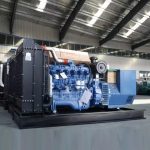Introduction
Diesel generators play a crucial role in providing backup power during emergencies, powering remote locations, and supporting off-grid operations. However, the environmental impact of diesel generators cannot be overlooked, as they are significant contributors to air pollution and greenhouse gas emissions. In recent years, there has been a growing emphasis on environmental standards and regulations to mitigate the negative impact of diesel generators on the environment. This article explores the environmental impact of diesel generators, the current environmental standards and regulations governing their use, and innovative technologies and practices that can help minimize their environmental footprint.
Environmental Impact of Diesel Generators
Diesel generators are known for their reliability, efficiency, and power output, making them popular choices for various applications. However, the combustion of diesel fuel in these generators produces a range of pollutants that can harm the environment and human health. The primary environmental impacts of diesel generators include:
1. Air Pollution: Diesel generators emit pollutants such as nitrogen oxides (NOx), particulate matter (PM), sulfur dioxide (SO2), and carbon monoxide (CO) during operation. These pollutants can contribute to smog formation, respiratory problems, and acid rain, posing risks to both the environment and public health.
2. Greenhouse Gas Emissions: Diesel generators are significant sources of carbon dioxide (CO2) emissions, a potent greenhouse gas that contributes to global warming and climate change. The combustion of diesel fuel releases CO2 into the atmosphere, exacerbating the effects of climate change.
3. Noise Pollution: Diesel generators produce noise during operation, which can disturb wildlife, residents, and workers in the vicinity. Prolonged exposure to high levels of noise can have adverse effects on human health, including hearing loss and stress-related disorders.
Current Environmental Standards and Regulations
To address the environmental impact of diesel generators, governments and regulatory bodies around the world have implemented various standards and regulations to control emissions and promote cleaner technologies. Some of the key environmental standards and regulations governing diesel generators include:
1. Emission Standards: Emission standards set limits on the amount of pollutants that diesel generators can emit during operation. These standards typically target pollutants such as NOx, PM, SO2, and CO and require generator manufacturers to use advanced emission control technologies to meet the specified limits.
2. Fuel Quality Standards: Fuel quality standards regulate the sulfur content and other impurities in diesel fuel to reduce emissions and improve air quality. Low sulfur diesel fuel is cleaner-burning and produces fewer pollutants when combusted in diesel generators.
3. Noise Regulations: Noise regulations establish permissible noise levels for diesel generators to minimize the impact of noise pollution on the environment and public health. Generator operators are required to implement noise mitigation measures, such as sound enclosures and mufflers, to comply with these regulations.

4. Environmental Permits: Generator operators may be required to obtain environmental permits from regulatory authorities before installing and operating diesel generators. These permits ensure that generators meet specific environmental standards and comply with all relevant regulations to protect the environment and public health.
Innovative Technologies and Practices for Environmental Compliance
In response to growing environmental concerns, the diesel generator industry has been developing and adopting innovative technologies and practices to reduce emissions, improve efficiency, and minimize environmental impact. Some of the key technologies and practices for environmental compliance include:
1. Tier 4 Emission Standards: Tier 4 emission standards, established by the U.S. Environmental Protection Agency (EPA), set stringent limits on NOx and PM emissions from diesel engines. Generator manufacturers have been incorporating advanced technologies such as selective catalytic reduction (SCR) and diesel particulate filters (DPF) to meet these standards and reduce emissions significantly.
2. go now : Hybrid power systems combine diesel generators with renewable energy sources such as solar, wind, and battery storage to reduce fuel consumption and emissions. By integrating renewable energy into the power generation mix, hybrid systems can lower operating costs and environmental impact while ensuring reliable power supply.
3. Cogeneration (CHP) Systems: Combined heat and power (CHP) systems, also known as cogeneration systems, generate electricity and heat simultaneously from a single fuel source. Diesel generators can be integrated into CHP systems to maximize energy efficiency, reduce emissions, and utilize waste heat for heating and cooling applications.
4. Remote Monitoring and Control: Remote monitoring and control systems enable generator operators to track performance, optimize fuel efficiency, and diagnose maintenance issues in real-time. By leveraging data analytics and automation, operators can improve operational efficiency, reduce emissions, and ensure compliance with environmental regulations.
Conclusion
Diesel generators play a vital role in meeting the power needs of various industries and applications, but their environmental impact cannot be ignored. To balance power generation with environmental responsibility, it is crucial for generator operators, manufacturers, and regulatory bodies to work together to adopt cleaner technologies, comply with environmental standards, and promote sustainable practices. By investing in innovative technologies, such as Tier 4 engines, hybrid power systems, and remote monitoring solutions, the diesel generator industry can reduce emissions, improve efficiency, and minimize environmental footprint. Ultimately, a collaborative effort towards environmental compliance will help mitigate the adverse effects of diesel generators on the environment and create a more sustainable future for generations to come.
